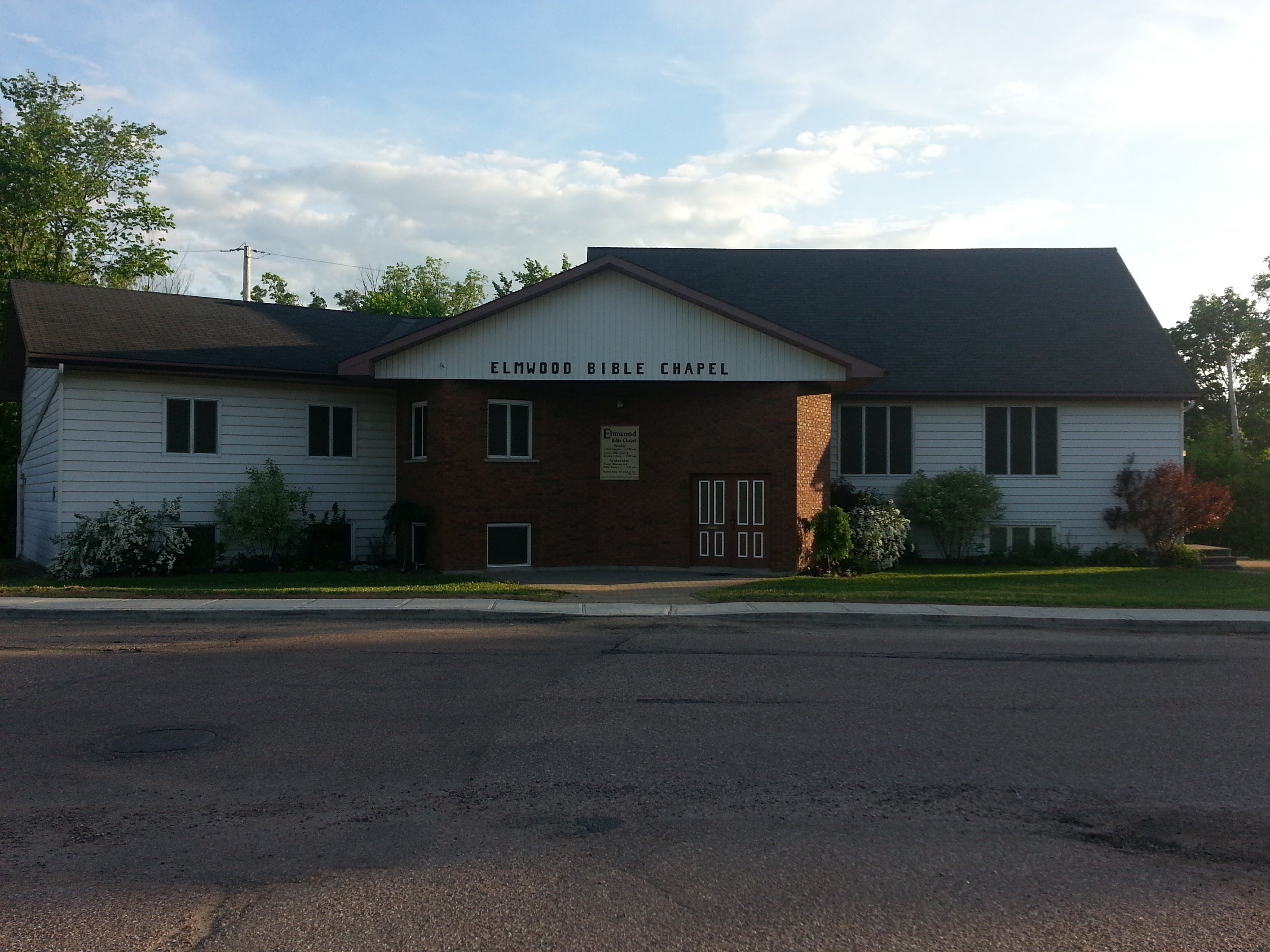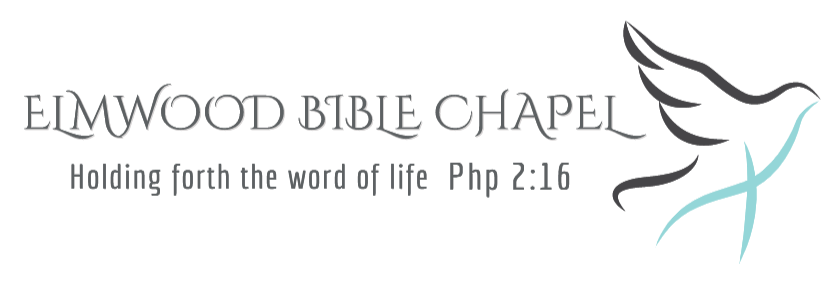

Elmwood Bible Chapel
Our Statement of Faith
Preface
The following statement of faith and guiding principles is set forth as our charter.
In this present age it is both difficult and necessary to hold firmly to those principles of scripture which prescribe the proper manner of operating in the local assembly. We trust that every member of the local church meeting at Elmwood Bible Chapel in Renfrew will consider these matters prayerfully.
The Elders
We believe;
1. the scriptures, both Old and New Testaments, to be the inspired Word of God without error in the original writings. The New Testament is the divine and final authority for all Christian faith, life, practice and government of the local church. (2 Timothy 3:16-17; 1 Thess. 2:13; 2 Peter 1:21)
2. there is but one God, infinitely perfect and eternally existing in three persons; Father, Son, and Holy Spirit. (Deut. 6:4; Matt. 28:19; Jn. 1:1-8; 1 Jn. 5:7).
3. Jesus Christ to be truly God and truly man (1 Tim. 3:16, 2:5-6) , having been conceived of the Holy Spirit and born of the virgin Mary (Luke 1:26-35; Matt. 1:20), sinlessly perfect (Heb. 4:15; 1 Peter 2:22; 1 John 3:5; 2 Cor. 5:21). Because of His sacrifice, the sinner finds in Christ a substitute (1 Peter 2:24) and a representative who forever pleads His blood for our justification (Heb. 7:25). He rose bodily from the dead (Luke 24:39) and ascended to His Father’s right hand (Eph. 1:20-23) where He now ministers as our Great High Priest (Heb. 4:14 -16; 9:24).
4. that man was created in the image of God (Gen. 1:27), but that each member of the human race is fallen, sinful and lost (Rom. 3:23; 5:12). Regeneration by the Holy Spirit is absolutely essential for the salvation of man (Titus 3:5; Rom. 8:9). Redemption is wholly by the blood of Christ (Heb. 9:12-14; 1 Peter 1:18-19) and salvation is by grace, through faith in our Lord Jesus Christ (Eph.2:5-9). Every true child of God possesses eternal life and is safe for all eternity (John 10:27-29; 5:24; 3:16; 1 John 5:13).
5. that each believer (upon believing) is indwelt and sealed by the Holy Spirit until the day of redemption (Eph. 1:13-14; 4:30). It is only through the power of the Holy Spirit that the believer can live a godly life (Gal. 5:16; 22-23).
6. that the true church is not an organization but a living organism comprised of all true believers, known as the body of Christ (1Cor. 12:12-27; Eph. 1:22-23). The local church is composed of believers in a locality (Phil. 1:1). They gather in Christ’s name as a corporate testimony to the Lordship of Christ (Col. 1:18) and to the oneness of the body of Christ (Jn.17:21). They gather to commemorate the Lord’s Supper (1 Cor. 11:23-26), for worship (Jn. 4:23), prayer (Acts 2:42), edification (Eph. 4:12; 2 Tim. 4:2). To propagate missions work (Matt. 28:19-20). Government and discipline are the responsibility of the local church (Matt. 18:15-17; 1 Cor. 5:1-13).
7. in the oneness of the Body of Christ, the Lord’s people, as such, should avoid taking names other than those which are given them in scripture, such as, “Christians” (Acts 11:26), “saints” (1 Cor. 1:2), “believers” (Acts 5:14), “brethren” (Heb. 2:11) and “disciples” (Acts 9:1; 9:26). Names other than these can cause division, (ie. 1 Cor. 1:10-17).
8. two Christian ordinances to be observed by the Church during the present age are; water baptism by immersion (Matt. 28:19; Acts 8:35-39), and the Lord’s Supper (Luke 22:19-20; 1 Cor. 11:23-28). Baptism is for believers upon confession of their faith in the Lord Jesus Christ (Acts 8:37). It signifies that the one being baptized has been crucified with Christ unto sin, has been buried with Him and is risen with Him to walk in newness of life (Rom. 6:3-6). The Lord’s Supper was commemorated by the early church on the first day of the week (Acts 20:7), and we believe that it is the privilege and duty of every true believer to heed the Lord’s request. “This do in remembrance of me” (Luke 22:19).
9. in the personal, pre-tribulation and imminent return of our Lord and Saviour Jesus Christ. (Acts 1:11; 1 Thess. 4:14-18; Titus 2:13; Heb. 9:28)
10. in the bodily resurrection of the just and the unjust (Jn. 5:29; 1 Cor. 15:51-55; Rev. 20:12-13), the just to everlasting life (Phil. 1:23; Rev. 22:4-5) and the unjust to judgement and everlasting conscious punishment (Matt. 25:46; 2Thess1:8-9; Rev 20:10-15; Luke 16:19-31).
11. that a woman should have her head covered at all meetings of the local church. (1 Cor. 11:1-16, Eph. 3:10)
12. that women are not to preach or to pray audibly in gatherings of the local church. (1 Cor.14:34-35, 1 Tim. 2:8-12)
Some Guiding Principles
Believers who wish to be received into fellowship with the assembly are interviewed by at least two elders. If they have a clear confession of faith in the Lord Jesus Christ as personal Saviour, subscribe to the statement of faith and are godly in their walk, they are announced to the assembly at the Lord’s Supper meeting one week in advance of reception.
Believers cease to be associated with the assembly fellowship for reasons such as listed below;
A) They move to another district and therefore are transferred by a letter or commendation (Rom. 16:1- 2; Acts 18:27).
B) They may be called home to heaven.
C) They may withdraw voluntarily.
D) They may be asked to withdraw as a matter of discipline for moral sin or doctrinal error (1 Cor. 5:7- 13; Rom. 16:17-18).
E) They may be absent for prolonged periods of time, in which case active fellowship has ceased.
Believers who wish to be baptized will be interviewed by at least two elders as to their confession of personal faith in the Lord Jesus Christ, and this being satisfactory, arrangements for baptizing them will proceed without delay.
Baptism and reception into fellowship may be simultaneous, provided that it is announced to the assembly as in the procedure for reception outlined above.
Marriage
We believe that marriage was instituted by God, and that it is to be between one man and one woman, and it is to be a life-long commitment. God created man and woman to be inseparably joined together in marriage (Gen. 2:20-24), which we understand to include a publicly recognized marriage ceremony conducted in accordance with the laws of Canada.
The Lord’s Supper Meeting
See article 8 in the statement of faith. The Lord’s Supper Meeting is held each Sunday. This service is not controlled or organized by one individual. It is neither elaborate nor ritualistic. This does not mean that it is without spiritual order or pattern. The meeting takes the form of spontaneous expressions of worship in hymns, prayers and the reading and expounding of the scriptures by those men who are moved by the Holy Spirit, while the women worship in silence.
The one loaf typifies the body of Christ (Luke 22:19). “Take, eat, this is my body given for you.” It also expresses the unity of the church (1 Cor. 10:17). “For we being many are one bread and one body.”
The wine typifies Christ’s shed blood (Matt. 26:28). “For this is my blood of the new testament which is shed for many for the remission of sins.”
After the giving of thanks the loaf is broken and passed from one to another among the believers. Similarly, the wine is passed in cups.
Church Government
1. The assembly shall not be subject to any outside ecclesiastical authority, but to God alone.
2. The Congregation of believers in fellowship shall not become part of any sect or denomination. They shall, however, recognize the oneness of the body of Christ (Jn. 17:21-23) and extend a hearty fellowship to any believer of like precious faith, loving all children of God. “That in every place call upon the name of our Lord Jesus Christ, both theirs and ours.” (1 Cor. 1:2)
3. Elders (presbytery) are responsible to guide the assembly in spiritual matters (1 Peter 5:2-3) as well as physical and financial matters. Development of an elder comes through the Holy Spirit (Acts 20:28). The Holy Spirit raises him up and he is readily recognized by his qualifications (1Tim.3:1-7; Titus 1:6-9), and as he performs his duty (1 Peter 5:1-3). The assembly and fellow elders will recognize their Holy Spirit appointment and esteem them (1Thess. 5:12-13). As God develops elders, these should be readily recognized by the elders who are already performing their duties and should welcome same into their position.
4. The general business of the assembly shall be conducted by the deacons who will meet on a quarterly basis. The elders and deacons will hold an annual general meeting and the minutes of this meeting will be available to all those in fellowship at Elmwood Bible Chapel.
Financial Matters
An offering is received from believers at The Lord’s Supper meeting (1 Corinth. 16:2).
Receipts for income tax purposes are provided for those who request it. Receipts are normally issued only once a year (after the end of the calendar year).
Donor Restricted Gift/Donation Policy
Spending of funds is confined to Elmwood Bible Chapel approved programs and projects. Each contribution directed toward an approved program or project will be used as restricted with the understanding that when the need for such a program or project has been met, or cannot be completed for any reason as determined by the Elders of Elmwood Bible Chapel, the remaining restricted contributions will be used where most needed.
The Objectives of an Assembly
The purpose of gathering the believers at the chapel is to follow scriptural injunctions (Acts2:42);
1. To maintain a corporate testimony to the Lordship of Christ and to the oneness of the body of Christ (Col. 1:18; Eph 4:3-6).
2. To commemorate the Lord’s Supper (Luke 22:19; Acts 20:7).
3. For mutual edification (Heb. 10:25).
4. For prayer (Acts 12:12; 1 Tim. 2:1).
5. For evangelism (Matt. 28:19-20).
6. For teaching the Word of God (2 Tim. 4:2).
7. For the propagation of missions;
A. Sending forth missionaries, home and abroad (Acts 13:2-3).
B. Praying for missionaries and supporting them financially (Col. 4:3; 2 Cor. 9:1-15).
C. Welcoming them back on furloughs (Acts 14:26-28).
Ministries Of The Local Church
The public Ministry is the responsibility of the elders. Speaking is not confined to one man. Instead a number of spiritually gifted men provide a ministry rich in scope and depth.
The oversight of all para-church functions and outreaches are the responsibility of the elders.
1. Believers should minister of their substance (Rom. 12:13a ; Luke 8:3).
2. Believers should be hospitable (Rom. 12:13b).
3. Older women should teach the younger women (Titus 2:4).
4. Believers should be an example by good works (Eph. 2:10).